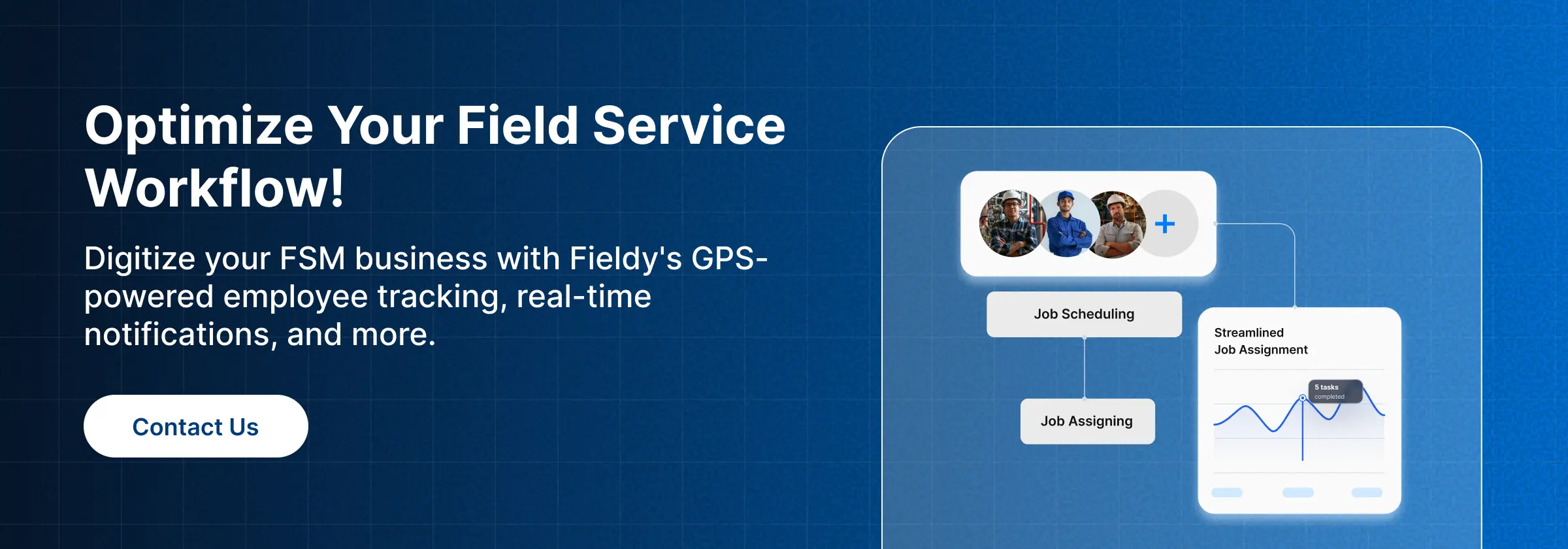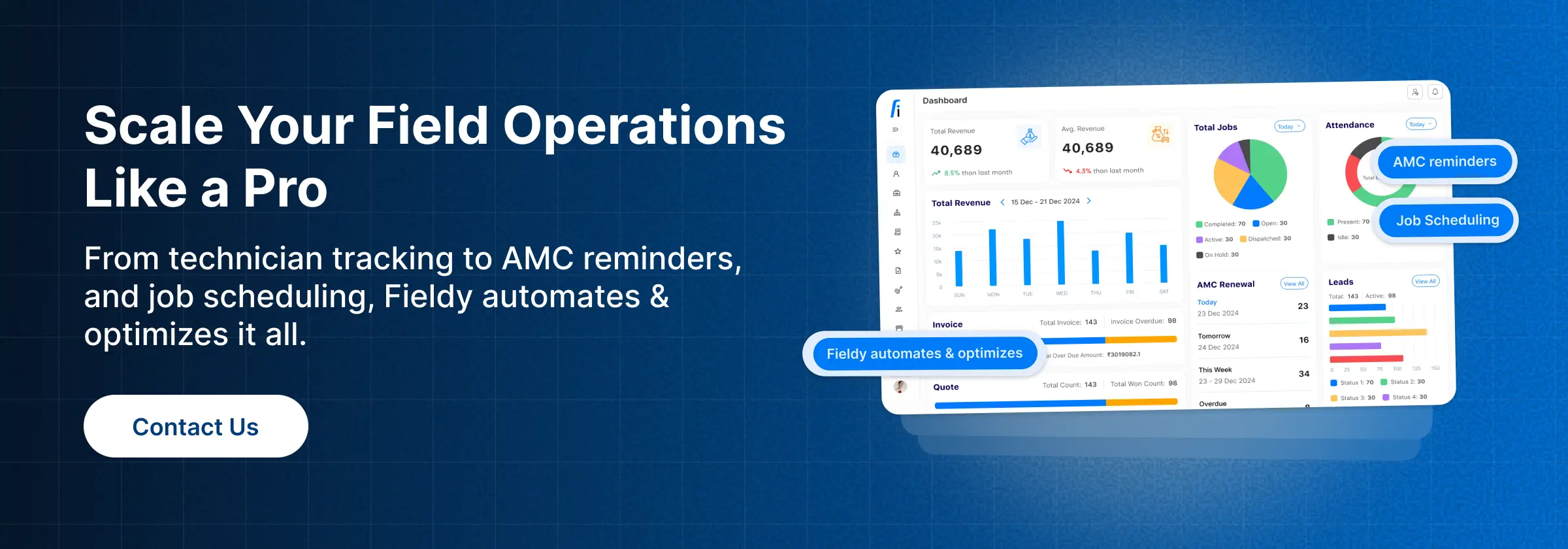Introduction
For service businesses in the field, contracts are not meant apart from paper; they are the operational backbone of every maintenance agreement, vendor association, and commitment of an SLA. Contracts enact the rules of engagement in everything, be it a repeated HVAC service contract or the liability clause of an external vendor.
But when these documents are handled manually or through disjointed systems, it causes delays, missed renewals, and compliance issues. By 2026, having visibility and centralized control of contract lifecycle has really gone from being a want to being an absolute necessity.
This is where Field Service Contract Management software comes into play, keeping end-to-end contractual lifecycle track-from contract creation to renewal-with lessened risk and increased efficiency of operations.
What Is Contract Lifecycle Management Software?
What is contract lifecycle management software in field service? Simply put, it is a digital contract management software solution that oversees every stage of a contract, from drafting and negotiation to implementation, compliance, and renewal. This contract management software definition highlights how automation reduces manual errors and ensures accuracy throughout the process.
In the context of field service, contract lifecycle management is critical because service delivery directly depends on contractual obligations. For example, if a plumbing company operates under a quarterly inspection SLA, the system monitors due dates, sends notifications to relevant teams, and automates contract renewals based on performance metrics.
Key stages covered by CLM tools:
- Creation using pre-built templates
- Negotiation & legal reviews
- E-signature-based execution
- Compliance tracking & alerts
- Renewal automation or contract termination
Market Growth: In the global contract lifecycle management software market, size ranges are estimated at £2.3 million to £3.2 billion, reaching $3 billion to $4 billion by 2026, growing bigger than £6 billion ($8 billion) by 2030, with annual growth being anywhere between 12% and 14%.
If you are managing technicians, vendor SLAs, or equipment warranties, Vendor Contract Management Software and Field Service Contract Management tools assist with the automation of the entire contract lifecycle to build trust and accountability.
Key Stages of the Contract Lifecycle in Field Services
1. Contract Creation
Modern field service companies rarely draft contracts from scratch. Using built-in templates for:
- Preventive maintenance SLAs
- Equipment rental agreements
- Emergency service contracts
These templates standardise language, ensure legal compliance, and drastically reduce creation time.
2. Negotiation and Review
Contracts generally require input from legal, finance, and operations. CLM software supports cross-department collaboration, versioning, and secured file sharing, thus shortening the negotiation period by 40%, as per ContractWorks Industry report of 2024.
3. Approval & Execution
Contracts don’t need to be chased for signatures any longer. In the presence of automated routing and integrated e-signatures, contracts can be executed remotely, diminishing time-to-deploy for field service technicians. The collaboration features let stakeholders approve contracts on their mobiles, an essential characteristic for field operation activities.
4. Compliance Tracking and Obligations
At this stage, all contract clauses are ensured to be implemented accurately, thus seriously limiting possibilities for any sort of mistrust and penalties. The field service management software integrates with CLM tools to track compliance in real time.
Key functions include:
- Notifying technicians about upcoming service dates so preventive maintenance and recurring tasks are never missed.
- Tracking scope deviations, such as unapproved work or material overuse, which can affect billing and SLA commitments.
- Sending alerts for penalty clauses or missed deadlines, allowing managers to act before fines or service disputes occur.
By linking contract terms to day-to-day operations, CLM systems provide a clear audit trail, reduce legal risks, and keep service delivery aligned with client expectations.
5. Renewal or Termination
Instead of manual follow-ups, automated alerts ensure proactive decision-making. Whether you choose to renew based on SLA performance or terminate due to missed benchmarks, the system simplifies the process with data-based insights.
Efficiency Gains: Companies report that CLM software can cut contract cycle times by 30–50%, lower contract management costs by up to 25%, and speed up approvals, resulting in increased accuracy, operational efficiency, and faster revenue recognition.
Why Is Contract Lifecycle Management Software Important for Field Service Businesses?
Reduced Risk and Manual Errors
A missed renewal deadline or misplaced service clause can lead to revenue loss and legal disputes. CLM systems reduce errors by up to 70%, as per a 2023 Forrester survey, by standardising and automating workflows.
Faster Job Execution through Contract-Linked Scheduling
Contracts are directly tied to work orders. For example, if a solar energy company signs an annual inspection contract, the CLM software auto-generates job schedules and assigns technicians. This ensures dispatch reliability and SLA compliance.
Audit Trails and Regulatory Compliance
Every action, from negotiation changes to task execution, is logged. In industries like electrical maintenance or fire safety, regulatory audits demand verifiable proof of delivery. With detailed contract histories and timestamped job records, businesses can remain audit‑ready, a key factor when addressing questions such as “What is Field Service Management?” and how it ensures compliance and accountability.
CLM Software vs. Standard Contract Management Tools
While traditional contract management tools act as static storage for signed agreements, like digital filing cabinets, contract lifecycle management software offers dynamic workflows that actively drive service operations forward.
Contract management software doesn’t just store documents; it automates and manages every phase of a contract’s lifecycle, making it especially valuable in the high-pressure, fast-paced world of field service.
Here’s how:
- Obligations Tracking: CLM platforms monitor key deliverables defined in contracts, such as scheduled maintenance visits, parts replacements, or response time commitments. For instance, if a contract promises quarterly equipment checks, the system automatically triggers reminders, assigns technicians, and tracks completion. This reduces human error and ensures your team fulfills every contractual promise.
- Renewal Decisions: Instead of letting contracts expire unnoticed, CLM tools send alerts well before expiration dates. More importantly, they provide performance insights (e.g., SLA breaches or successful job completions) that help managers make data-backed decisions, whether to renew, renegotiate, or terminate a contract.
- SLA Verification: With real-time data feeds from field service management software, CLM tools can cross-check whether service-level agreements (SLAs) are being met. If a contract promises a 4-hour emergency response time, the system logs technician arrival data to validate compliance. This builds transparency and improves client confidence during audits or performance reviews.
Together, these features enable field service businesses to transform contract documents into actionable, measurable workflows that reduce risk, increase accountability, and improve service quality across the board.
For example, Fieldy goes beyond mere document storage; it links contracts with technician schedules, inventory records, and compliance data, keeping the entire service chain aligned.
This level of integration answers the question, “What is Contract Management Software in Field Service?” by showing how it streamlines operations end to end.
What to Look for in a Contract Lifecycle Management Tool for Field Service
How to choose contract management software? Choosing the right contract management software means ensuring it supports both standard contract processes and the unique demands of field service operations.
Must-Have Features
- Automated Renewal Alerts: Keeps contracts from expiring without anyone noticing by sending timely reminders for review or renewal.
- Mobile Access for On-Site Approvals: Allows technicians and managers to view, approve, or update contracts directly from the field, speeding up decision-making.
- Role-Based Access Controls: Ensures sensitive contract data is only visible to relevant roles, technicians, legal, finance, or managers.
- Integration with Scheduling & FSM Platforms: Links contract terms to job scheduling, ensuring tasks tied to SLAs are automatically dispatched and tracked.
These features help teams stay coordinated, avoid lapses, and act quickly on contractual obligations.
Field Service-Focused Features
- GPS-Enabled Service Zones: Restricts contract coverage to specific locations, ensuring technicians are dispatched within agreed service areas.
- Asset-Based SLAs: Tracks service terms tied to individual equipment, ideal for managing warranties, recurring inspections, or uptime guarantees.
- Service Records Access: Let technicians instantly access contract-linked service histories for better troubleshooting and accurate job completion.
Whether you’re managing HVAC units, plumbing contracts, or electrical maintenance, these tools keep operations aligned with what’s promised in the contract.
Final Thoughts
Simplify Complex Contract Lifecycles with the Right Tools
In field service, time is money. Automating your contract workflows can improve service speed, operational accuracy, and renewal clarity. Contract lifecycle management software ensures your business stays ahead of deadlines, avoids disputes, and builds client trust.
Ready to streamline your service contracts?
Get started with Fieldy’s contract management solutions designed for modern field service teams.
FAQs:
What can contract lifecycle management software be used for in field service?
A: A contract lifecycle management software automates the creation, execution, and review of contracts for field service companies with the potential to combine this with SLA management, technician scheduling, and vendor contracts with the least possible intervention.
How SLA compliance is improved by the CLM system?
A: A CLM system can work with field service management systems to remind parties of obligations, record task completion, and check actual performance of contract terms — resulting in parties meeting SLA objectives consistently.
What does contract management software do?
A: Contract management software automates the creation, tracking, and renewal of contracts, ensuring compliance, timely alerts, and reduced manual errors.
What differentiates CLM from a standard document management solution?
A: Standard solutions mainly focus on storing contracts, whereas a CLM solution manages the whole lifecycle process of contracts, wherein approval, deadlines, job obligations, and renewals are tracked in one integrated system.
Does Fieldy offer contract lifecycle management tools for field service?
A: Yes. Fieldy offers integrated contract lifecycle management features tailored for industries like HVAC, plumbing, and electrical. It links contracts directly to scheduling, technician activity, and SLA metrics.




